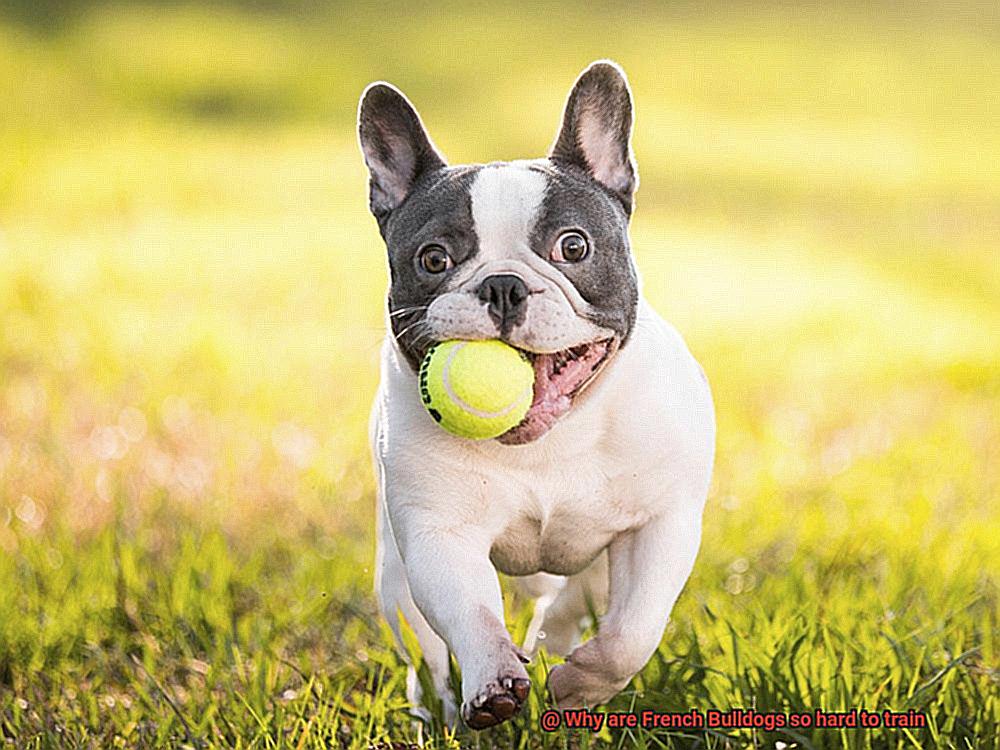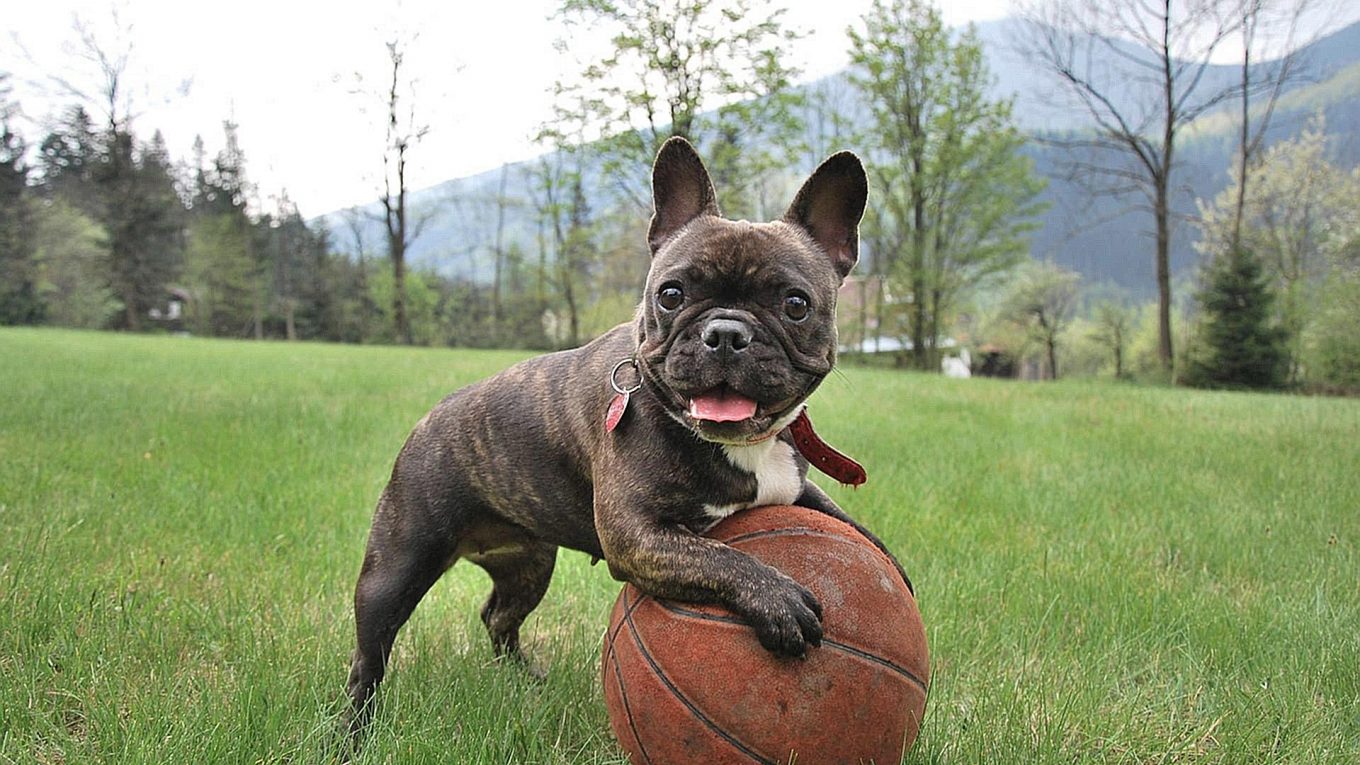Why are French Bulldogs so hard to train?
French Bulldogs, with their adorable squishy faces and playful personalities, make for the perfect companions.
But let’s be real here – training them can be a real challenge. Maybe it’s their stubborn streak or their strong-willed nature, but French Bulldogs seem to have a mind of their own when it comes to obedience.
If you’ve ever found yourself frustrated and scratching your head wondering why your French Bulldog just won’t listen, trust me, you’re not alone. In this blog post, we’ll dive deep into the reasons why French Bulldogs are so darn hard to train and share some tips and tricks to make the whole process a little less hair-pulling.
So, grab your favorite beverage and get ready to unravel the mysteries of training these beloved furry friends.
Exploring the Reasons Why French Bulldogs are Difficult to Train
Contents
- 1 Exploring the Reasons Why French Bulldogs are Difficult to Train
- 2 French Bulldogs’ Strong-Willed Personality as a Training Challenge
- 3 Lack of Motivation in French Bulldogs During Training Sessions
- 4 Short Attention Span: A Common Challenge With French Bulldogs
- 5 Sensitivity to Heat and Exercise Impacting Training for French Bulldogs
- 6 The Need for Consistent Training Methods with French Bulldogs
- 7 Socialization Challenges Faced by French Bulldogs When it Comes to Training
- 8 Overcoming the Challenges of Training a French Bulldog
- 9 Conclusion
French Bulldogs are known for their adorable looks and affectionate nature, but training them can be quite a challenge. If you’re a French Bulldog owner struggling with training, you’re not alone. In this blog post, we will explore the reasons why French Bulldogs are difficult to train and provide you with expert tips and insights to help you overcome these challenges.
The Power of Positive Reinforcement:
French Bulldogs are sensitive souls who respond best to positive reinforcement. Instead of using punishment or forceful methods, focus on rewards and praise when they exhibit desired behaviors. Treats, toys, or even a simple belly rub can work wonders in motivating your French Bulldog to learn and follow commands.
Short Attention Span:
French Bulldogs have a natural curiosity that can easily distract them during training. Keep your sessions short and engaging, breaking them into smaller increments throughout the day. This will help maintain their focus and prevent them from getting bored or overwhelmed.
Consistency is Key:
French Bulldogs thrive on routine and consistency. Establish clear rules and boundaries from the start, and make sure every family member follows them consistently. Inconsistency can confuse your furry friend and hinder their progress in training.
Adapt Training to their Unique Physical Needs:
Due to their short snouts, French Bulldogs have limited endurance and are prone to overheating. Adjust your training sessions accordingly by providing plenty of breaks and avoiding intense physical activities in hot weather. Opt for mental stimulation exercises such as puzzle toys or obedience training indoors.
Socialization Matters:

Early socialization is crucial for French Bulldogs to develop good behavior around other dogs and people. Expose them to different environments, sounds, and experiences from a young age to help them become well-rounded companions. Consider enrolling in puppy socialization classes or scheduling playdates with friendly dogs to foster positive interactions.
Conclusion:
Training French Bulldogs can be a challenging yet rewarding journey. By understanding their unique characteristics and tailoring your training approach to their needs, you can overcome these challenges and build a strong bond with your furry companion. Remember, patience, consistency, and positive reinforcement are the keys to success.
French Bulldogs’ Strong-Willed Personality as a Training Challenge
In this comprehensive guide, we will tackle the training challenges posed by their strong-willed personalities and provide you with expert tips and tricks to conquer them.
Understanding the Strong-Willed Nature:
French Bulldogs have a reputation for being as stubborn as a baguette wedged in a toaster. This stems from their history as pampered companions, which has led to a sense of entitlement and independence. Additionally, their high intelligence can make them master manipulators, using their smarts to outwit their owners.
Consistency and Patience:
When it comes to training French Bulldogs, consistency is the key ingredient in your recipe for success. Establish clear boundaries and maintain consistent rules to avoid any confusion. Positive reinforcement methods, such as treats and praise, work wonders with this breed. Remember, you catch more flies with honey than vinegar.
Short and Engaging Sessions:
French Bulldogs have the attention span of a goldfish at times, so keep your training sessions short and sweet like a macaron. Incorporate fun and interactive activities to keep them engaged and motivated. Remember to mix up the training routine to keep things interesting for both you and your Frenchie.
Adapt to Their Physical Needs:
French Bulldogs have unique physical needs due to their brachycephalic (short-nosed) structure. Avoid strenuous exercise or training in hot weather to prevent respiratory issues. Opt for gentle activities like puzzle toys or nose work that stimulate their minds without putting excessive strain on their bodies.

Early Socialization:
Socializing your Frenchie from an early age is as important as a good croissant at breakfast. Expose them to different environments, people, and other animals to help them develop better social skills. This will reduce the likelihood of behavioral issues and ensure that your Frenchie is a well-rounded member of society.
Seek Professional Help:
When the going gets tough, don’t be afraid to ask for help. Enlist the services of a professional dog trainer who specializes in working with French Bulldogs. They’ll have the expertise and experience to tailor training techniques to suit their stubborn nature, ensuring success in your training endeavors.
Lack of Motivation in French Bulldogs During Training Sessions
French Bulldogs are known for their stubbornness and independent nature, which can make them less motivated to participate in training sessions. Unlike some other breeds, French Bulldogs may not be as eager to please their owners, leading to a lack of motivation during training. They have a strong sense of self-determination and may prefer to do things their own way rather than following instructions.
Additionally, the breed’s low energy levels can contribute to their lack of motivation. French Bulldogs are generally not as active or energetic as some other breeds, making training sessions seem like a chore to them. Their preference for lounging around rather than engaging in physical activity can make it challenging to keep their attention during training.
Moreover, French Bulldogs have a tendency to become easily distracted during training sessions. Their curious nature may lead them to explore their environment or become fixated on something else rather than focusing on the training. This can make it difficult to maintain their interest and enthusiasm throughout the session.
To overcome the lack of motivation in French Bulldogs during training sessions, it is crucial to find ways to make the training sessions engaging and rewarding for the dog. Using positive reinforcement techniques such as treats, praise, and play can help motivate French Bulldogs and make the training sessions more enjoyable for them. Breaking down the training into small, manageable steps and gradually increasing the difficulty can also help maintain their interest and prevent boredom.
Finding activities that align with the breed’s natural instincts, such as nose work or puzzle toys, can provide mental stimulation and keep them engaged during training. Consistency and patience are key when working with French Bulldogs. It may take longer for them to grasp new commands or behaviors, but with time and perseverance, they can become well-trained dogs.
Seeking professional help from a dog trainer who specializes in French Bulldogs can also be beneficial in addressing the lack of motivation and finding effective training techniques tailored to the breed’s specific needs. A trainer with experience in working with French Bulldogs will understand their unique characteristics and be able to provide guidance on how to motivate them during training sessions.
Short Attention Span: A Common Challenge With French Bulldogs
French Bulldogs, known for their adorable looks and playful personalities, often come with a common challenge: a short attention span. Training these furry buddies can be quite the task, as they easily get distracted and lose interest in repetitive tasks or commands. But fear not. With a few tips and tricks up your sleeve, you can effectively train your French Bulldog and keep their attention focused. Let’s dive in.
Understanding the Short Attention Span of French Bulldogs
French Bulldogs have a low boredom threshold, meaning they quickly lose interest in repetitive tasks or commands. This is due to their playful and independent nature. They are easily distracted by their surroundings and often prioritize exploring or playing over following commands. Additionally, their stubborn streak can make it difficult to keep their attention during training sessions.
Tips for Effective Training
- Keep it Short and Engaging: French Bulldogs have a limited attention span, so keeping training sessions short and engaging is key. Aim for 10-15 minutes of focused training at a time, incorporating play breaks to keep them motivated.
- Positive Reinforcement: Motivate your French Bulldog by using positive reinforcement techniques such as treats, praise, and play. Rewarding them when they perform desired behaviors will encourage them to stay focused and eager to learn.
- Be Consistent: Consistency is crucial when training French Bulldogs with short attention spans. Establish a routine and use clear, concise commands to help them understand what is expected of them. Stick to the same verbal cues and hand signals to avoid confusion.
- Patience and Persistence: Training a French Bulldog with a short attention span may take longer than with other breeds. Be patient and persistent, repeating commands and behaviors until they grasp them. With consistent training, they will improve over time.
- Mental Stimulation: French Bulldogs need mental stimulation just as much as physical exercise. Provide puzzle toys or interactive games to keep their minds engaged and prevent boredom. This will help them focus better during training sessions.
- Seek Professional Help: Working with a professional dog trainer who has experience with French Bulldogs can be incredibly beneficial. They can provide guidance on effective training techniques tailored to this breed’s specific needs, helping you overcome any challenges you may encounter.
Sensitivity to Heat and Exercise Impacting Training for French Bulldogs
French Bulldogs may be adorable with their smushy faces and playful personalities, but their sensitivity to heat and exercise limitations can pose challenges when it comes to training. As a French Bulldog owner, it’s important to understand how these factors can impact your furry friend’s progress in training. Let’s dive into the topic and explore some strategies to overcome these obstacles.
The Brachycephalic Challenge
One of the defining characteristics of French Bulldogs is their brachycephalic facial structure, which means they have a shortened nose and a flat face. While this gives them their unique appearance, it also makes them more prone to overheating. Their respiratory system is compromised, making it difficult for them to regulate their body temperature efficiently.
During training sessions, French Bulldogs can quickly become overwhelmed by the heat, leading to exhaustion and discomfort. This can hinder their ability to focus and learn new commands. Therefore, it’s crucial to be mindful of the signs of heatstroke, such as excessive panting, drooling, rapid breathing, weakness, and collapse. Training sessions should be scheduled during cooler parts of the day, such as early morning or late evening.
Exercise Limitations
French Bulldogs have limited exercise tolerance due to their short snouts. Their respiratory system is not as efficient as that of breeds with longer noses, making it challenging for them to breathe properly during intense physical activity. This can result in fatigue and an inability to sustain prolonged exercise.
To ensure your French Bulldog’s safety during training, provide plenty of water and shade. Never leave them outside in hot weather without access to water and a cool resting area. It’s also advisable to keep training sessions shorter with frequent breaks to prevent overexertion.
Impact on Training Progress
The sensitivity to heat and exercise limitations of French Bulldogs can impact their overall training progress. Due to the need for shorter training sessions, it may take longer for them to learn new commands and behaviors. This requires patience and consistency from the owner.
Positive reinforcement techniques are particularly effective in training French Bulldogs. Using treats, praise, and rewards can help motivate them to learn. It’s essential to keep training sessions fun and engaging to maintain their interest and enthusiasm.
The Need for Consistent Training Methods with French Bulldogs
French Bulldogs are undeniably charming and lovable, but their stubbornness and independent nature can make them quite the challenge to train. If you’re a proud Frenchie owner or considering bringing one into your family, it’s crucial to understand the importance of consistency when it comes to training these adorable little dogs. In this section, we’ll explore why consistent training methods are essential for French Bulldogs and how they can lead to a well-behaved and happy pet.

Routine is Key
French Bulldogs thrive on routine. They are creatures of habit and need clear and consistent instructions to understand what is expected of them. By establishing a regular training schedule and sticking to it, you’ll create a structured environment that will help your Frenchie learn more effectively.
Distraction-Free Training
French Bulldogs may be intelligent, but they can also be easily distracted. During training sessions, it’s crucial to eliminate any potential distractions and create a focused environment. Find a quiet space where you can work with your Frenchie without interruptions, ensuring that their attention is solely on the training at hand.
Positive Reinforcement Works Best
Positive reinforcement techniques are highly effective when training French Bulldogs. These methods involve rewarding good behavior with treats, praise, or playtime. By focusing on positive reinforcement rather than punishment or harsh training methods, you’ll create a positive association in your Frenchie’s mind, making them more eager to learn and please you.
Stay Calm and Patient
French Bulldogs are sensitive creatures that can pick up on their owner’s emotions. If you become frustrated or impatient during training sessions, your Frenchie may become stressed or anxious, hindering their ability to learn effectively. It’s essential to remain calm and patient throughout the training process, creating a positive and stress-free atmosphere for your furry friend.
Short and Engaging Sessions
French Bulldogs have short attention spans, so keeping training sessions brief and engaging is crucial. Aim for short bursts of training, focusing on one command or behavior at a time. By making the sessions fun and enjoyable, you’ll prevent your Frenchie from getting bored or disinterested, ensuring that they remain engaged and motivated.
Start Early and Socialize
Training should begin early with French Bulldogs, ideally during their puppyhood. Starting early allows them to develop good habits and behaviors from a young age, making it easier to train them as they grow older. Additionally, socialization is crucial for French Bulldogs to prevent shyness or aggression towards strangers or other animals. Exposing them to different people, animals, and environments will help them become more well-rounded and confident dogs.
Socialization Challenges Faced by French Bulldogs When it Comes to Training
French Bulldogs are beloved for their charming appearance and friendly demeanor. However, when it comes to training, these adorable pups can present some unique challenges. One of the key factors contributing to these difficulties is their socialization challenges. In this blog post, we will explore the specific socialization challenges faced by French Bulldogs and provide tips and strategies to overcome them.
Protective and Territorial Nature:
French Bulldogs have a natural inclination to be protective and territorial. This can lead to aggression or fear when encountering new situations or unfamiliar individuals. To address this challenge:
- Gradually expose your Frenchie to different environments, people, and dogs from an early age.
- Use positive reinforcement techniques to reward calm and appropriate behavior.
- Seek professional help if your Frenchie displays signs of aggression or fear that are beyond your control.

Breed History:
French Bulldogs were originally bred as companion dogs, not for intense working or obedience tasks. Their independent and stubborn nature can make it challenging for owners to establish themselves as the pack leader during training sessions. To tackle this challenge:
- Be patient and consistent in your training efforts.
- Use positive reinforcement methods, such as treats and praise, to motivate your Frenchie.
- Break training sessions into shorter, engaging segments to maintain their focus.
Brachycephalic Challenges:
French Bulldogs have a brachycephalic (short-muzzled) structure, which makes it harder for them to regulate body temperature. This can impact their comfort level during training sessions. To overcome this challenge:
- Avoid training during extreme temperatures or strenuous physical activity.
- Provide plenty of water breaks and ensure a comfortable environment.
- Keep an eye out for signs of fatigue or overheating, such as excessive panting or collapsing.
Early Socialization:
Early socialization is crucial for French Bulldogs to become comfortable with various people, animals, and environments. To overcome socialization challenges:
- Start socializing your Frenchie as early as possible, exposing them to a variety of situations.
- Use positive reinforcement to reward calm and confident behavior during socialization experiences.
- Gradually increase the level of difficulty in socialization situations to build their confidence.
Overcoming the Challenges of Training a French Bulldog
Training a French Bulldog can be a rewarding yet challenging experience. These adorable and independent dogs have their own unique set of training challenges. However, with the right approach and techniques, you can overcome these obstacles and successfully train your Frenchie. In this blog post, we will explore some effective strategies, including patience, consistency, positive reinforcement, and proper socialization, to help you unlock your French Bulldog’s training potential.
Patience is Key:
French Bulldogs are known for their stubbornness, but it’s important to remember that patience is key when training them. They may take longer to learn certain commands or behaviors compared to other breeds, so it’s essential to be patient and persistent. Avoid getting frustrated or losing your temper, as this can hinder the training progress.
Consistency is Crucial:
Consistency is vital when training a French Bulldog. Establishing consistent rules and expectations will help your Frenchie understand what is expected of them. Use clear and concise commands, and reinforce them consistently. Avoid confusing your Frenchie by using different commands for the same behavior.
Positive Reinforcement Works Wonders:
French Bulldogs respond best to positive reinforcement techniques. Rewarding good behavior with treats, praise, or playtime will motivate them to repeat those behaviors in the future. Avoid using forceful or punitive methods, as this can cause fear or anxiety in your Frenchie, making training more challenging.
Proper Socialization:
Socialization is crucial for French Bulldogs to prevent separation anxiety and aggression towards other dogs. Expose your Frenchie to various people, environments, and situations from a young age. This will help them become well-rounded and confident dogs. Enroll in puppy classes or organize playdates with other well-behaved dogs to ensure proper socialization.
Find the Right Motivation:
Understanding what motivates your Frenchie is key to effective training. Some Frenchies are food motivated, while others respond better to playtime or verbal praise. Experiment with different rewards to find what motivates your Frenchie the most. This will make training more enjoyable and effective for both of you.
Seek Professional Help:
If you’re struggling with training your French Bulldog, don’t hesitate to seek professional help. A trainer who specializes in French Bulldogs can provide personalized guidance and techniques tailored to the breed’s specific needs and challenges. They can help you overcome training obstacles and set your Frenchie up for success.
Em5WE9QFfa0″ >
Conclusion
French Bulldogs can be quite a challenge when it comes to training. Their stubborn nature and independent streak often make them resistant to following commands. It’s not that they are unintelligent, but rather that they have their own agenda and prefer to do things their way. This can make the training process frustrating and time-consuming.
One reason for their difficulty in training is their strong-willed personality. French Bulldogs are known for being headstrong and determined, which can make them less inclined to listen to their owners. They have a mind of their own and will often choose to ignore commands if they don’t see the benefit or if it doesn’t align with their desires.
Another factor is their sensitive nature. French Bulldogs are highly attuned to their surroundings and can easily become overwhelmed or anxious. This sensitivity can make them more cautious and hesitant when it comes to learning new commands or engaging in unfamiliar activities. They may require extra patience and gentle encouragement during the training process.
Additionally, French Bulldogs have a relatively short attention span. They get easily bored or distracted, which makes it challenging to hold their focus during training sessions. It’s important to keep training sessions short, engaging, and varied to prevent them from losing interest or becoming disengaged.
Despite these challenges, with the right approach and consistency, French Bulldogs can still be trained successfully. Positive reinforcement techniques, such as rewards and praise, work best with this breed as they respond well to encouragement rather than harsh discipline.
In conclusion, while French Bulldogs may present some unique difficulties in training, understanding their personality traits and adapting your approach accordingly can lead to successful results.




